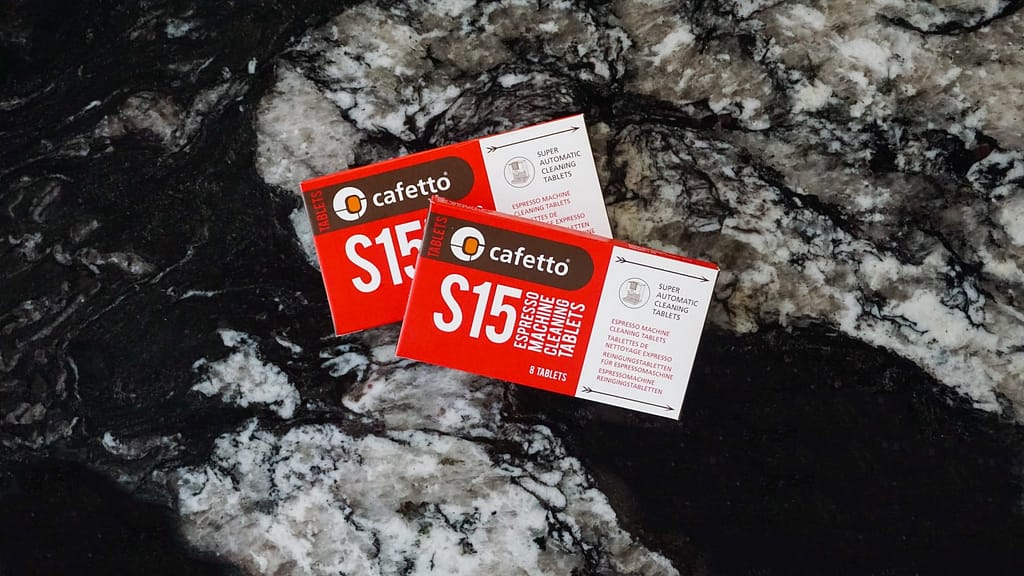[[{“value”:”
Cafetto explains why its tableting process is unlike any other and how its ‘no one size fits all’ mentality ensures it has a cleaning product suited for every coffee machine.
Like most high-volume machinery, coffee equipment requires frequent cleaning to perform at its best. To help café owners and baristas keep on top of this, global cleaning specialist Cafetto has developed an extensive tablet range which covers traditional machines, automatic machines, and milk-system cleaning.
“Cafetto manufactures and distributes over 30 tablet products, such as our Tevo Mini and Maxi Espresso Machine Cleaning Tablets, to remove coffee oils, grounds and stains, and improve the taste and aroma of espresso once the machine is cleaned,” says Cafetto Research and Development Manager Daniel Knowles.
“Our tablets span a variety of shapes, diameters, and weights. The different varieties are specifically suited to the application, machine type, and cleaning purpose.”
Cafetto’s objective is to provide an effective cleaning solution that doesn’t lose its efficacy within fast-paced environments, such as a café that requires thorough cleaning in a timely manner.
“We wanted to provide a sustainable solution, so we created low-water content products that reduce transport emissions due to the reduced weight. These products also had to be applicable across many machines and environments,” Knowles says.
“The solution was pre-weighed, pre-portioned tablets, with simple instructions for use that cater to all user-experience levels. Each product comes with straightforward instructions and easy-to-follow pictograms, so all the customer needs to do to use the right tablet on the right machine to create the right results.”
Despite the tablets’ ease of use, Knowles says the science behind them is quite complex.
“Essentially, they’re a blend of minerals, biodegradable detergents, and binders, with the ratios of these ingredients depending on the final application of the cleaning. Tablets are made by compressing a powder under large amounts of force to cause the specialised particles to fracture and mechanically interlock with one another. This mechanism helps provide the tablets’ dissolution characteristics,” he says.
Image: Cafetto
According to Cafetto, the dissolution time in the cleaning cycle is an important factor to ensure it removes built-up coffee oils and residue.
“Cleaning cycles can vary in length, and the dissolution profile is modelled to this. If the cleaning cycle is short, the tablet must dissolve quickly to allow the cleaning actives to function correctly. On a longer cleaning cycle, the dissolution period can release the cleaning actives over time. This comes down to a tailored dissolution profile for the tablet, effervescence, and disintegration-based dissolution,” says Knowles.
“For example, Cafetto’s S15 Espresso Machine Cleaning Tablets are formulated to dissolve in automatic cleaning cycles to provide optimal cleaning performance.”
According to Knowles, Cafetto’s unique tablet formulation is inspired by pharmaceutical and homecare technologies.
“It’s a cross-pollination of industry technologies,” he says. “We are very specific about what we do, with a ‘no one size fits all’ mentality. Each of our tablet products is made to respect the unique needs and complexities of each machine type.”
The tablet manufacturing process is finalised by sealing the products in plastic jars or blister packaging.
“The rationale behind the blister packs is to provide a cleaning experience that’s completely touch free, along with the peace of mind that the product is protected in tamper-proof packaging. It’s designed to make the cleaning process even easier from start to finish,” Knowles says.
Knowles says being a trusted brand and significant contributor to the global coffee industry has allowed Cafetto to share its knowledge on the importance of cleaning products in the production of excellent coffee.
“We want our customers to have faith in what Cafetto does and know we maintain close communication and reputable service to support our customers’ journey with us,” Knowles says.
“We are always looking ahead for ways to support our growth. That’s just part of Cafetto’s DNA, and our commitment to the industry that has supported us in return for many years.”
The Cafetto team is committed to continuous improvements and solutions as it grows. Knowles says he has confidence in its plans and processes to tackle whatever comes next.
“We will always monitor and act promptly on any discrepancies to control what we can deliver to customers and distributors. We’re currently focused on adding to our sustainable business practices and making our tablet formulation process as eco-friendly as possible,” he says.
Cafetto’s certified-organic range forms part of its strategy to promote a greener future for the coffee industry, and abolish the stigma that these types of products are more expensive and less effective than their traditional counterparts.
“Cafetto has always been environmentally conscious. We decided very early in the business’ life to not only produce traditional products but also include an organic range,” Knowles says.
“One of our best traits as a company is being a good listener and pivoting towards customer needs, such as operating in a sustainable manner. We always listen to our customers’ requirements regarding market trends, then find a way to deliver. Doing so has led to successful product development, improvements, and long-lasting relationships.”
For more information, visit cafetto.com
The post Cafetto on its custom-fit cleaning process appeared first on Global Coffee Report.
“}]]


